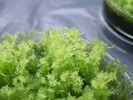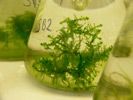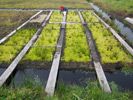PROSUGA

Joint project: commercial production of Sphagnum as basic ingredient for growing media in commercial horticulture.
After the development of suitable floating rafts for Sphagnum cultivation within the MOOSFARM project, the objectives of the PROSUGA project is to test those rafts at a larger scale. Further research aims to optimise all parts of the production chain including diaspore production, raft production, pre-cultivation of Sphagnum plants, large scale Sphagnum cultivation, and harvest technologies as well as the production of growing media and further trials with the new growing media.
Contents
In accordance with the production chain there are seven sub-projects aiming to improve and test the different parts of the production process. A precondition for the large-scale production of Sphagnum is the availability of large amounts of diaspores. As Sphagnum is legally protected in Germany, it is not permitted to gather plants from natural habitats. Thus trials are conducted in order to test generative and vegetative propagation. (UG).
The partner company mst is developing a prototype of floating raft where the Sphagnum propagules are already mechanically included into the material surface. This concept forms the basis for industrial scale Sphagnum cultivation on open water. In order to accelerate the growth of the Sphagnum crop on open water, the Sphagnum plants are pre-cultivated by the partner company NIRA.
Joint network partners
- University of Greifswald,
Institute of Botany and Landscape ecology (UG) - Humboldt-University of Berlin,
Institute of Horticultural Sciences (HUB) - Institute of Agricultural and Urban Ecological Projects
at the Humboldt-University in Berlin (IASP) - Torfwerk Moorkultur Ramsloh Werner Koch GmbH & Co. KG (MoKuRa)
- mst-Dränbedarf GmbH (mst)
- Niedersächsische Rasenkulturen NIRA GmbH & Co. KG (NIRA)
- Rosengut Langerwisch GmbH & Co. KG (RoLa)














